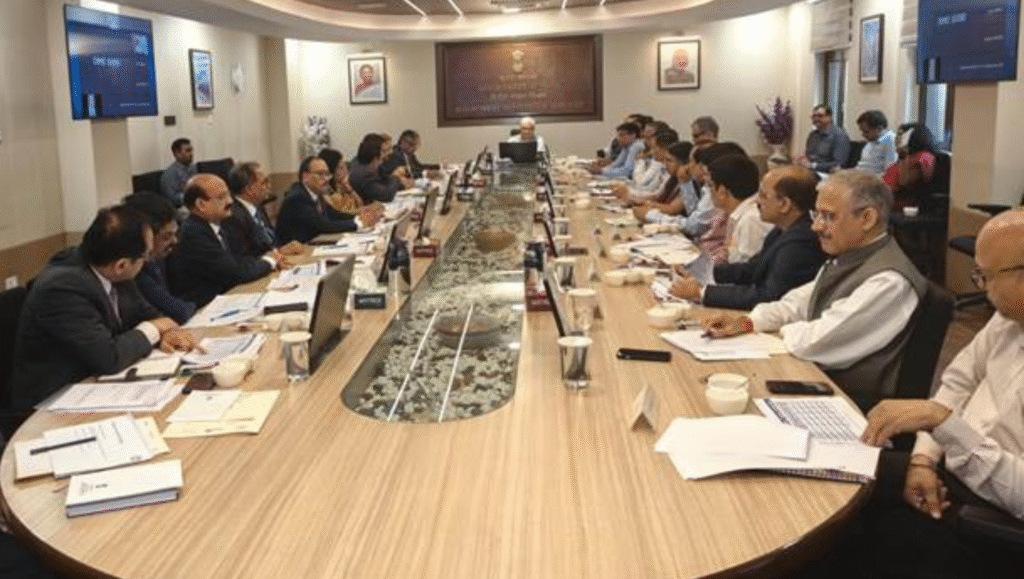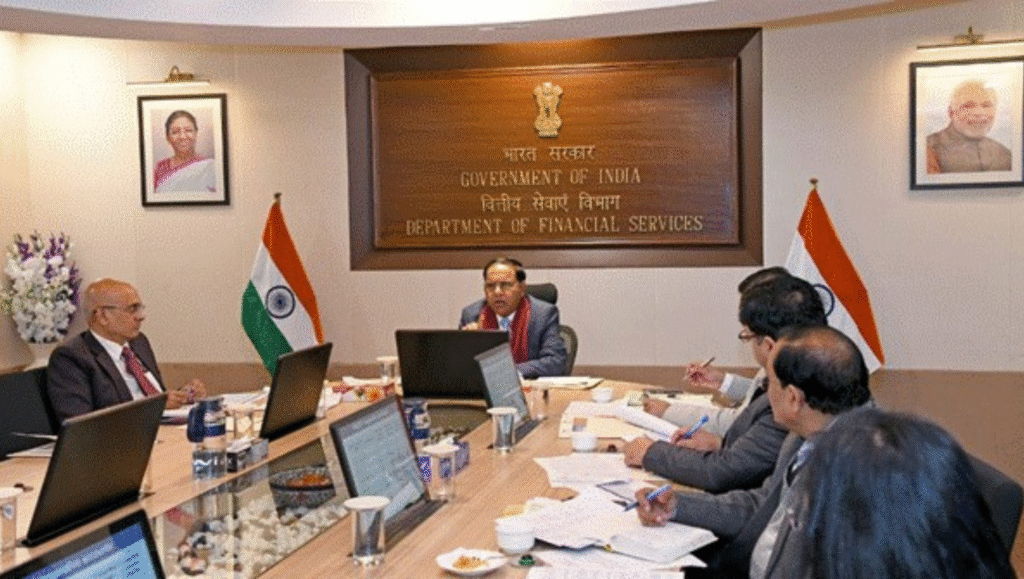
Shri M Nagaraju, DFS Secretary, Department of Financial Services (DFS), Ministry of Finance, presided over a high-level review meeting on June 4, 2025, in New Delhi to review the progress of Public Sector Banks (PSBs) in deepening financial inclusion, digital banking, and economic empowerment.
The conference, where Managing Directors and CEOs of PSBs, top DFS officials, and virtual members from SIDBI, Mudra Ltd., and the Indian Banks’ Association (IBA) participated, reflected India’s dedication to making its USD 3.5 trillion economy stronger by having effective banking reforms.
Despite high profits and enhanced asset quality, issues such as access to MSME credit and rural connectivity gaps risk slowing down the pace toward a USD 3 billion financial inclusion market by 2030.
The review was centered on crucial performance indicators, such as financial health, digital infrastructure, cybersecurity, and priority sector lending, especially to agriculture and MSMEs, which account for 40% of India’s GDP, according to a 2024 FICCI report.
Nagaraju praised PSBs for their history-making ₹1.29 lakh crore net profit during April–December 2024, a 31.3% year-on-year growth, led by a net NPA ratio of 0.59%, the lowest in a decade, according to a 2025 Economic Times report.
Total business increased by 11% to ₹242.27 lakh crore, with deposits increasing 9.8%, indicating enhanced financial stability, according to the same report.
Nagaraju assessed developments under flagship financial inclusion programs such as Pradhan Mantri Jan Dhan Yojana (PMJDY), with 54.97 crore accounts, Pradhan Mantri Mudra Yojana (PMMY), which has given loans worth ₹25 lakh crore to 43 crore entrepreneurs, and Stand-Up India, giving loans of ₹40,700 crore to 1.8 lakh SC/ST and women entrepreneurs, according to a 2024 DFS release.
He asked PSBs to expedite loan disbursals to SC/ST groups under Stand-Up India and achieve MUDRA targets, focusing on inclusive credit access.
The meeting also looked at PM Vishwakarma, PM SVANidhi, and PM Surya Ghar Yojana, which have improved credit and social security among artisans, street vendors, and solar energy adopters, respectively, according to a 2025 PIB release.
Easier access to banking and payments infrastructure was a central priority, expanding in unbanked villages, especially in North Eastern states, where a mere 60% of villages enjoy traditional brick-and-mortar branches, according to a 2024 SIDBI report.

Nagaraju emphasized addressing connectivity and infrastructure challenges to accelerate digital payment growth, citing a 300% increase in UPI transactions since 2020, according to a 2024 CII report. Cybersecurity was another priority, with PSBs advised to strengthen frameworks amid a 25% rise in cyber threats in 2024, per a Nasscom report.
Customer-centric initiatives, including timely grievance redressal, were highlighted to enhance banking experience, aligning with the Jan Dhan-Aadhaar-Mobile (JAM) trinity’s 80% financial inclusion milestone, per a 2024 DFS report.
Government initiatives support these efforts. The Production-Linked Incentive (PLI) programme, with ₹50,000 crore, supports MSMEs, accounting for 30% bank credit. PM Gati Shakti reduces logistics expense by 20%, facilitating rural banking growth.
The Open Network for Digital Commerce (ONDC) improves MSME compliance, enhancing loan requests by 25%. Skill India’s 2 million skilled workers, although only 5% banking tech-savvy according to Nasscom, assist digital uptake. The Public Financial Management System (PFMS) automates credit transactions, lowering leakages by 30%, according to a 2024 CGA report.
Issues continue. MSMEs experience delayed credit access, with 40% of loan proposals languishing because of cumbersome documentation, which costs ₹1–2 lakh per month, according to a 2024 SIDBI report. Rural connectivity gaps, where irregular power supply hits 20% of bank branches, hamper digital banking.
Regulatory overhang in tech clearances (4–6 years compared to China’s 2) and low ONDC usage, with only 15% of MSMEs registered, constrain efficiency. Volatility in international trade, affecting 30% of export-facing MSMEs, puts more pressure, according to a 2024 UNCTAD report.
Solution proposals come from experts. Subsidies through the Technology Upgradation Scheme can reduce MSME expenses. Increasing Skill.
